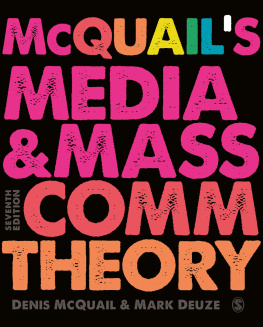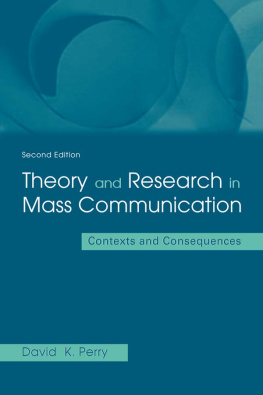The University of Chicago Press, Chicago 60637
The University of Chicago Press, Ltd., London
1969 by The University of Chicago
All rights reserved. Published 1969
Paperback edition 2010
Printed in the United States of America
19 18 17 16 15 14 13 12 11 10 2 3 4 5 6
ISBN-13: 978-0-226-78971-2 (paper)
ISBN-10: 0-226-78971-3 (paper)
ISBN-13: 978-0-226-78979-8 (e-book)
Library of Congress Cataloging-in-Publication Data
Tarde, Gabriel de, 18431904.
On communication and social influence; selected papers. Edited, and with an introd. by Terry N. Clark.
p. cm. (The Heritage of sociology)
Includes bibliographical references.
1. Sociology. 2. Social influence. I. Clark, Terry N., ed. II. Title. III. Series.
HM51 .T36
301
69014824
 The paper used in this publication meets the minimum requirements of the American National Standard for Information SciencesPermanence of Paper for Printed Library Materials, ANSI Z39.48-1992.
The paper used in this publication meets the minimum requirements of the American National Standard for Information SciencesPermanence of Paper for Printed Library Materials, ANSI Z39.48-1992.
Gabriel Tarde
ON COMMUNICATION
AND SOCIAL INFLUENCE
Selected Papers
Edited and with an Introduction by
TERRY N. CLARK
THE UNIVERSITY OF CHICAGO PRESS
CHICAGO AND LONDON
THE HERITAGE OF SOCIOLOGY
a Series Edited by Donald N. Levine
Morris Janowitz, Founding Editor
Preface
Some of the neglect of Tarde in the English-speaking world is due to the fact that several of his more serious works have never been translated. Accordingly, to present a meaningful sampling of his many contributions, it has been necessary to translate for the first time more than three-quarters of the selections contained in the present volume.
The hackneyed dictum that there are no satisfactory translations must inevitably come to the mind of anyone attempting to render Tardes work in English, for he was a a stylist who enjoyed manipulating language as much as he did ideas. One is tempted to simplify his complex verbal constructions by rewording them in more contemporary English prose, especially when he deals with technical questions. But this would be to destroy the poetic elements of his work. While this is by no means a poetic translationfor we are not poetswe have retained some of Tardes stylistic gymnastics rather than force him into the idiom of contemporary social science. For his own set of technical concepts, which are only partially translatable into those currently in use, we have sought the closest English equivalents.
The translation was accomplished in three stages. N. Claire Ellis, a graduate student at the University of Chicago, prepared a first draft, which was then checked and edited line by line by Priscilla P. Clark, assistant professor of French at the University of Illinois at Chicago Circle. Finally, Terry N. Clark reviewed the translation once again, revising it and adding editorial comments in conjunction with Priscilla P. Clark.
Morris Janowitz, as colleague and general editor of the Heritage of Sociology Series, provided advice throughout the development of the volume. Peter M. Blau, Philip M. Hauser, Steven Lukes, Fred L. Strodbeck, and George W. Stocking offered useful suggestions for the Introduction. Fred E. Duffell served once again as a thoroughly professional typist. M. Guillaume de Tarde generously provided the photograph of his father which appears on the cover.
Introduction
Gabriel tarde ranks as one of the three most outstanding sociologists of nineteenth-century France, but, especially in recent years, he has been read less closely than either Auguste Comte or Emile Durkheim. Too often dismissed as a debator of Durkheim who lost, or the dated antecedent of Le Bon, Tarde has been stigmatized as an inchoate and imprecise philosophical or literary writer. Such misconceptions, magnified many times by distorted secondary accounts, have flourished. Remarkably few are those who have sufficiently penetrated Tardes work to find more than support for their preconceived notions. This volume has been prepared to facilitate a more careful examination of Tarde.
Tarde contains much of value for the present-day social scientist. The famous debate with Durkheim did not in fact terminate with a clear victory for either side; each man contributed to a more sophisticated picture of the relationships between the individual and society, and in the debate one finds many issues clarified which later writers have seldom considered in such detail. Awareness of the problems raised in the debateand the solutions of Tarde and Durkheimheightens ones sensitivity to basic issues of the nature and scope of sociology, problems that plague sociologists even today.
One finds too, in Tarde, the elaboration of a general conceptual framework that serves to integrate middle-level theory and emipirical analysis. But the integration provided by this framework is not simply one of dry categorization: abstract formulations are skillfully combined to generate middle-level propositions which, in turn, generally either are tested or the necessary evidence is indicated which would serve to confirm or reject them. One can observe, in Tardes hands, how such a general frameworkone which incorporates innovation, conflict, and change as central elementscan serve as a powerful beam to bring into focus and illuminate selected empirical problems.
The propositions concerning imitation and diffusion, which derive largely from this framework, are among the most stimulating of Tardes ideas for contemporary research. Criminologists, too, find some some of their guiding concepts in Tardes writings on deviance and social control. Tarde also scrutinized collective behavior, mass communication, and public opinion, not as isolated phenomena but as elements to be explained within the context of broader societal patterns. But unlike subsequent mass society theorists, Tarde integrated his discussion of macro-societal changes with those on the small group level. In this way, for example, he arrived at a two-step model of communication flow. In following Tarde through these and other problems, we can observe a versatile mind, always seeking, often reaching, the ideals that he set for the creative thinker. Finally, in presenting his thoughts Tarde offers a model of literary exposition that more contemporary writers would do well at least to consider if not to imitate.
I. Life
Jean-Gabriel Tarde was born in the small town of Sarlat, about one hundred miles east of Bordeaux, in 1843.
Tardes own father (17971850) served as a military officer until his two brothers were killed in the wars of Napoleon, but then turned to law under family pressures and finished his life as a judge in Sarlat. At forty-four he married the nineteen-year-old daughter of another established Sarlat family, Anne-Aline Roux. Jean-Gabriel was their only child. His father died when he was only seven, and he was raised by his mother, to whom he remained exceptionally close throughout her life.
Tarde attended a school in Sarlat operated by Jesuit priests, who offered a rigorous classical training built largely on Latin, Greek, history, and mathematics. While always the first student in his classes, the sensitive young Tarde was pained by the Jesuit discipline, so much so that during his last three years, while a boarder at the school, he once even scaled the wall to escape temporarily. Although Tarde never failed to praise the classical training for binding together the leaders of nation with a common set of values, he retained a permanent distaste for socially imposed discipline whenever it limited individual freedom. The scholastic training also moved him toward a strong emphasis on the role of the intellect as well as an even more hierarchical conception of society than was held by many of his contemporaries.
Next page









 The paper used in this publication meets the minimum requirements of the American National Standard for Information SciencesPermanence of Paper for Printed Library Materials, ANSI Z39.48-1992.
The paper used in this publication meets the minimum requirements of the American National Standard for Information SciencesPermanence of Paper for Printed Library Materials, ANSI Z39.48-1992.